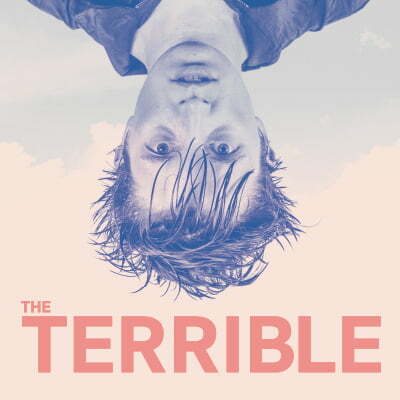The Terrible
Directed by Jesse Roth
Produced by The New Colony
Playing at The Den Theatre, Chicago
There are many religions which posit the afterlife as a place where the dead learn from their mistakes in life, in order to achieve spiritual completeness. If the kinds of therapies employed there are anything like ones on the mortal plane, then the afterlife is pretty terrible. That’s the premise of Morgan McNaught’s new play, now being produced by The New Colony. A mixture of Jean-Paul Sartre’s No Exit and Sarah Kane’s 4:48 Psychosis, The Terrible depicts three wretched souls under the dominion of a being that regards itself as benevolent, despite the pointless pain he inflicts on his prisoners. McNaught’s play provides a realistic depiction of the various kinds of self-loathing that trap people into miserable existences, and is well-acted. Its flaw is that the rules of its version of the afterlife, assuming there are any, are so vague, it’s hard to understand why anything happens the way it does, other than that the writer wanted to explore psychological torment.

We open with a silent scene of performance artist Woolfe (Jessica London-Shields) changing into a jumpsuit, and setting up recording equipment. She then hangs herself by the wrists from the ceiling, activates a device that fills the room with water, and livestreams her suicide to Vimeo. Meanwhile in the next life, Fred (Andrew Hobgood) is putting Gertrude (Shariba Rivers) and Chris (Chris Fowler) through their latest round of talk therapy, meaning self-depreciation. After that, it’s time for role-playing. The worst moment of Chris’s life was when his jealous boyfriend shot him in the head, so that’s what Chris is forced to re-live, with Gertrude stepping in as the boyfriend. Through Fred’s magic, Chris feels the same physical sensations during the re-enactments, as well as the same terror. By changing what he says each time and watching the results, Chris is supposed to be learning something about what he could have done differently. Sometimes, he gets shot in the gut, first.
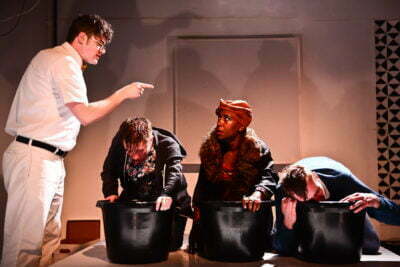
Chris is very eager to please Fred and makes excuses for him, just as he did in life for his boyfriend. Gertrude, however, pushes back against him more often. Fred can’t even do her the simple courtesy of calling her by her preferred nickname. She’s just here until her son dies and joins her, she says, and since she died in 1939, that shouldn’t be too much longer. But every time Fred gets angry, he clicks his pen, causing great pain to both prisoners. When Woolfe arrives, wet and cold, the other two hurriedly explain things to her. Woolfe is resistant to Fred’s authority, and Fred has her role-play in Gertrude’s worst experience: the time she surrendered her son to her ex-husband and his new wife in exchange for money. Woolfe’s worst experience was her suicide, so she gets put through that again, and gets to watch Gertrude re-enacting it, too. When Fred asks her why she did it, Woolfe describes her lifelong battle with bi-polar disorder. He doesn’t accept that explanation as good enough.
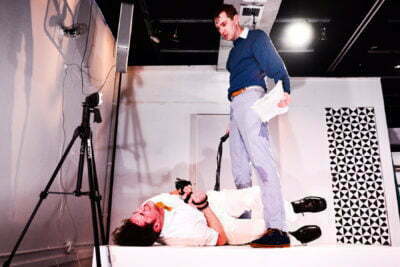
The actors playing the prisoners provide a strong sense of who each of their characters is. Gertrude is prickly and a little disdainful; while roleplaying Woolfe writing her suicide note, she is clearly unimpressed with Woolfe’s attempt at a poetic description of her last meal at The Golden Nugget. Chris is a peacemaker who defines peace as submission to one-sided violence. He’s the most personable of the three, but the least trustworthy, and the one with the most faith that their exercises are helping them grow. Woolfe, who was probably the only one of them who had professional counseling in life, is by far the most skeptical. Besides being initially shocked that she still exists in some form, she had always understood her depression to be mainly neurological, and is confused by how a mind-body link works in the afterlife (they’d have to be still be corporal for the physical tortures to work). But she recognizes that, whatever his intention, Fred’s methods are about fulfilling his own sadism.
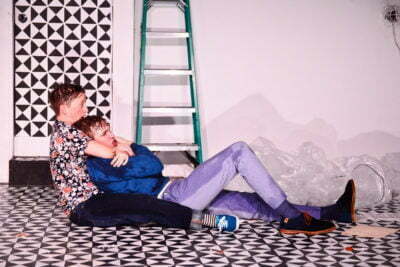
So why do they put up with him? Eventually, they rebel, but until then, they are held in place by an undefined horror, represented by a roaring noise and flickering light, on the other side of the door leading out. Whatever it is disturbs them so much they’d rather remain in the room, despite being physically capable of walking through the light and noise, and Fred promises that his treatments will cause the destructive force to disappear. He has cabinets full of files on other people who have apparently been cured and left peacefully, though nobody else seems to remember those people, and Gertrude’s been here a long time. We also learn that this is one of many Freds, although his nature is never defined. Regardless, Woolfe rightly points out that his treatments are worthless. He never says what problem any of them is supposed to be working on, and his use of collective corporal punishments, which include drowning, piercing noises, seizing control of them and forcing them to punch each other, and suffocation, betray a lack of any real concern for their psychological health.
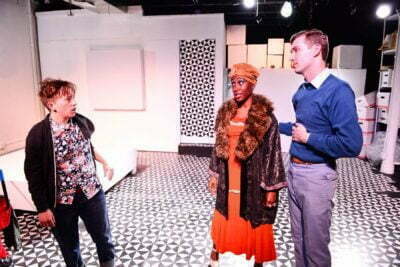
One the other hand, Fred’s incompetence as a therapist doesn’t mean he’s mistaken about the rules of this world’s magic. But if he knows what they are, nobody else seems to. Woolfe’s lines imply that when Chris gets shot in his re-enactments, he’s actually being shot, and then resurrected through a click of Fred’s pen. Later, a character seems to die permanently, against the wishes of the person who winds up with the pen, and I found Woolfe’s resolution regarding the door confusing. These undefined rules undermine the dramatic situation, and obscure the point of the play. In fairness, No Exit’s rules were not defined either, but its moral was. The Terrible seems to be decrying the ineffectiveness of mental health treatments, which is a fair point, but not always obviously connected to its story. New Colony’s production has an interesting design and accomplished acting, and voices some legitimate complaints about the mental healthcare system that apparently aren’t being heard in wider society. But it also gets distracted by halfway sketching a world around its characters.
Somewhat Recommended
Jacob Davis
[email protected]
Reviewed October 19, 2015
For more information, see The Terrible’s page on Theatre in Chicago.
Playing at The Den Theatre Upstairs Mainstage, 1333 N Milwaukee Ave, Chicago. Tickets are $20-25 with discounts for students and seniors. To order, visit thenewcolony.org. Performances are Thursdays-Saturdays at 7:30 pm. Running time is seventy minutes with no intermission.

